Revisiting Everson: My Country - Sweet Land
Todd R. McFarland March/April 2007
Getting your Trinity Audio player ready...
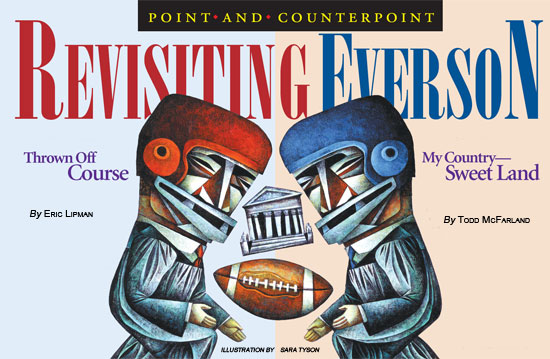
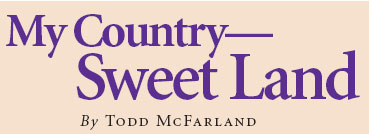
A presenter at a conference on religious liberty recently told a story about a woman from east central Texas he met on an airplane. The woman was complaining loudly about the Supreme Court decision prohibiting prayer over the public address systems at Texas public high school football games. He explained to her that he had recently returned from Kazakhstan and assured her that Christians in that predominantly Muslim state would not be excited at all by the government promoting religion. Her response: "But this is our country."
By "our" she was referring to the view of the United States that she saw in the middle of Texas—where the most exciting thing to do on a Friday night is go to high school football games. Hers is a White, Christian country that goes to church on Sunday, gets parenting tips from James Dobson, and thinks nothing of referring to the United States as a "Christian nation."
Lipman's view of church/state relations suffers from this same myopic view of the United States. In his worldview the U.S. is a country of Christians and for Christians and "maintain[ing] this grant of liberty for future generations" means the liberty to worship as he does. If you want to worship another way, well then you had better do better in the next election because there may be no judicial protection for you.
It is almost trite to say a major reason the U.S. has not experienced sectarian violence as have other countries is because of its neutrality toward religion, but it is nevertheless true. We have done this by putting significant barriers to the majority, using the state to enforce its religious views on minorities.
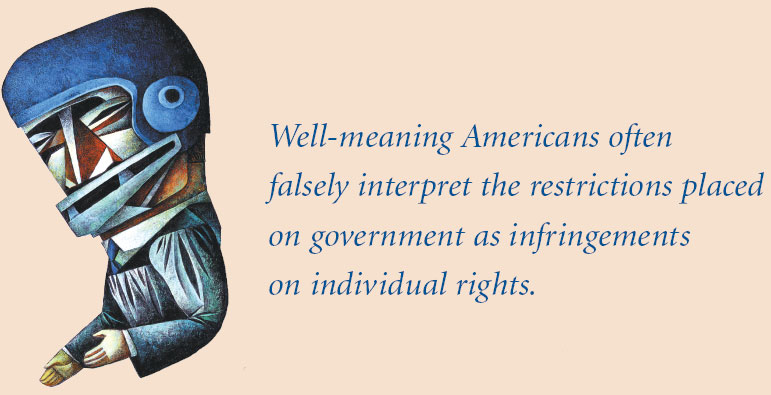
The case law governing this issue is complicated and not nearly as restrictive as Lipman implies, but restrictions do exist. When the Supreme Court prohibited school-sponsored prayer, it was not an infringement on the teacher's rights; it was a restriction on government's rights. When a school teacher stands in front of a classroom full of children whose attendance is required by law, he is not speaking in his voice; he is speaking on behalf of the state.
Just like any other employee, the teacher gave up many of his "rights" in exchange for a paycheck. He cannot decide to go to the golf course that day even though he certainly has a constitutional right to freedom of movement. He gave that up by agreeing to show up and teach class. He cannot expound for the entire class period on his views of Chaucer when he was hired to teach chemistry. And he cannot pray publicly before the class because it is not him speaking, it is the state.
This of course raises the overall question, should the state be so restricted—which in turn raises the fundamental question of what kind of country we want to live in and what view we have of individual liberty? Do we want to live in a country in which the rights of the majority always trump the minority, or do we want to live in one where the majority gives up some of its rights in exchange for protecting minorities? First, though, Lipman's legal reasoning bears examination.
Lipman argues that the First Amendment should not be applied against the states, and cites the text of the First Amendment itself as evidence: "Congress shall make no law. . . " and also cites an 1866 case, Ex parte Garland, 71 U.S. 333. The problem with Lipman's analysis is that he completely ignores how the Supreme Court got to the decision in Everson.
The Supreme Court, beginning in 1897, started to interpret the due process clause of the Fourteenth Amendment which prohibits the states from depriving individuals of the "privileges or immunities of citizens of the United States. . . [or] deprive any person of life, liberty, or property without due process of law. . . " as applying part of the Bill of Rights against the states. The reason it did this was that the question the Supreme Court had to answer was What are the rights this part of the Fourteenth Amendment guarantees? The Court answered this question by "incorporating" various portions of the Bill of Rights into the Fourteenth Amendment and thereby applying them to the states. This is how you get an amendment that says "Congress shall make no law" applying to the states.
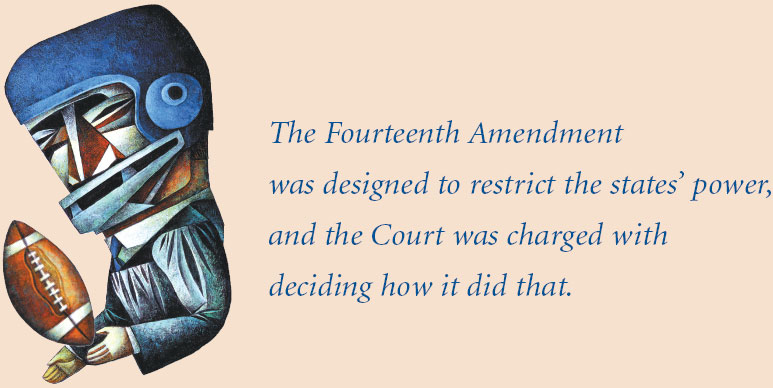
So Everson was in a change in the Court's jurisprudence, but it was one based upon a change in the Constitution. The Fourteenth Amendment was designed to restrict the states' power, and the Court was charged with deciding how it did that. Lipman's citing of a case decided two years before the Fourteenth Amendment was ratified does not address the issue of whether the Fourteenth Amendment prohibits states from establishing religion.
Putting aside the textual and interpretative questions raised, what does Lipman's America look like? Lipman provides no reason for treating the Establishment Clause differently than any other portions of the Bill of Rights, so presumably he opposes incorporating any of the Bill of Rights against the states. Thus, the police (state, city, and county) would be free to bang down the door of any citizen at any time without getting a warrant. The state could pass a law making it a felony to criticize the governor or any other elected official. You would not have the right to counsel at trial, or a speedy trial, or to know the charges, or to confront the witnesses against you. You would not have the right to be compensated if the state seized your land to build a road or a new stadium.
Lipman would probably respond that most, if not all, of these rights are guaranteed by the states in their constitutions. This is true, and if the Supreme Court were to rule tomorrow that the Bill of Rights is no longer applied to the states, the U.S. would not be instantly turned into a version of the Communist-era Soviet Union.
The question would still remain, though, of what rights the federal government should guarantee all of its citizens. Should Delaware be allowed to imprison its citizens without a jury trial, or is that a right all Americans should have? Or more to the point, should a state be allowed to establish an official church and ban all others? Should Utah be allowed to make membership in the Church of Jesus Christ of Latter-day Saints mandatory? Should Missouri be allowed to outlaw Islam? Could California ban all religion?
There is little reason to believe (and quite a bit of evidence to believe the opposite) that the citizens of Utah, Missouri, or California would ever pass such legislation even if allowed to and Lipman would argue strongly that he is not supporting such measures. But it is the protections against such legislation that he is seeking to abolish, and that is what is dangerous.
The danger may be more real than we like to admit. When it comes to religion, local groups can often feel as if it is "their" country, like the woman in Texas said. They fail to see the harm in a teacher praying before a test, or a prayer being offered in the name of Jesus Christ before the legislature opens. But this sense that those who believe differently are "others" and therefore do not merit protection is a strong one. America's history of protecting minorities through the ballot box is not a strong one.
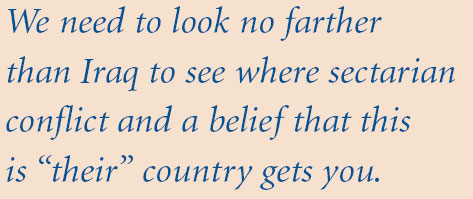
Perhaps public prayer is not the biggest threat to religious liberty and the biggest step to the state establishing religion. After all, students routinely ignore teachers, and there is no reason to think prayer time would be any different. The number of citizens who ever hear a single word uttered in a state legislating session is probably less than the NFL attendance on any given Sunday. And the reality is that not every decision made by the Court in Establishment Clause cases is logical or consistent, as Lipman points out by quoting Rehnquist in Wallace.
But there is wisdom in pushing the line back as far as you can. Discrimination may start out by having Christian prayers at a football game, but then the next thing you know cities are outlawing the religious practices of a disfavored religion even though those same practices are legal if done for a secular purpose. We need to keep our fights about where the boundary between church and state is in a place that the harm of making a wrong decision is minimal.
Keeping this debate where it is now, where regardless of what the courts decide there is not going to be a significant imposition on anyone's right to worship freely, makes sense. It may be annoying to Christians that a principal cannot start the day off with prayer over the public address system in a public school, but how big an infringement is that on the right to follow the dictates of one's conscience? I am unaware of any biblical command requiring this; in fact, I seem to remember a story about Jesus advocating private prayer. Had the decision gone the other way, it certainly would not be comfortable for a nonbeliever to be subjected to someone else's religion every day, but the intrusion is short, and see the earlier comment about ignoring teachers.
This is the beauty of our system, no one can get that much of an upper hand through the democratic process in the area of religion. If you want everyone to believe like you, then you need to hold more evangelistic series, not work harder at the polls. We need to look no farther than Iraq to see where sectarian conflict and a belief that this is "their" country gets you.
In America we are forced to put up with views we don't agree with and religions we think are wrong. This keeps the citizens from expecting everyone to look and believe like them, and as a result they are less likely to think it is their moral duty to blow away those who don't. I for one think that is a good thing, and in return I am willing to forgo hearing the president of the sophomore class pray for victory before the big game.
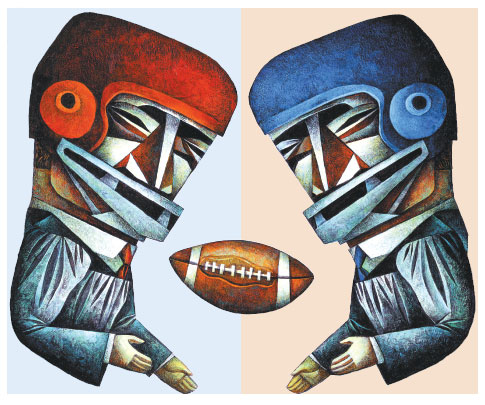
Todd McFarland is a lawyer with considerable experience in litigating church-state employment issues. A Seventh-day Adventist, he writes from Silver Spring, Maryland.
1 Church of the Lukumi Babalue Aye, Inc. vs. City of Hialeah, 508 U.S. 520 (1993).
2 Luke 18: 10-14